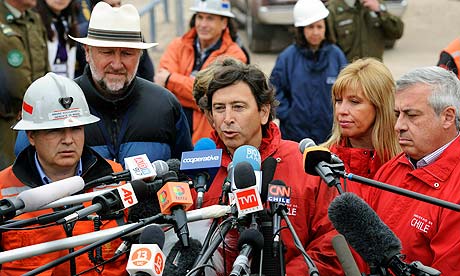Trapped Chilean miners: countdown to the party of a lifetime
![]()
Waiting families are focus of nation’s euphoria
Rory Carroll and Jonathan Franklin at the San José mine

Another sunset over Camp Hope, and as temperatures dropped the Avalos family huddled closer to the fire, savouring the heat while the wood and charcoal lasted. Sparks fizzed and died in the inky blackness.
Everything has changed. This improvised settlement of miners’ relatives, once a desolate wasteland fearing the worst, is now the focus of a nation’s euphoria. A lonely vigil has become a crowded, giddy countdown to the party of a lifetime.
Families which came here yearning for news are now the news themselves, their every smile, every hug, recorded and transmitted to a watching world. “You’d barely recognise the place,” said Alfonso Avalos, 53, father of two sons trapped below, rubbing his hands in front of the flames.
Sixty-five days after the San José mine collapsed in Chile’s northern desert, trapping 33 miners, the site above resembles a peculiar carnival. A clown entertained children in Spider-Man costumes. A van served burgers and sausages. Tents sprouted from the rocks. Reporters in fleeces spoke into TV cameras.
Authorities announced on Saturday night that a drill had reached the miners, and the men 700 metres below would probably start to be extracted on Wednesday.
The news triggered joy across Chile. Two months ago this was a country that lived off mining but did not know its miners, the men from mostly poor families and hardscrabble towns who vanished into the earth and lived largely invisible lives.
Now, after a drama to rival Apollo 13, this other Chile has intruded into the shiny, cosmopolitan Chile. Isabel Allende, a leftist senator for the region, hailed the country’s sense of togetherness. “This is the Chile we want.”
Caspar Quintana, the bishop of Copiapó, said the crisis had changed the country. “There is an incredible sense of unity and solidarity throughout society.”
The Avalos family did not argue with that. The fire’s glow illuminated prestigious visitors who stopped to chat: Laurence Golborne, the mining minister; Gerardo Roja, the mayor of their home town, Salamanca; even Chavela Vargas, a Mexican-American pop star.
“We appreciate the support. It’s wonderful to see all these people here,” said Alfonso, sipping mate, the bitter tea-like beverage, from a wooden gourd. The family nodded. There was a silence. Nobody wanted to spoil the carnival spell, but hovering in the night chill was a doubt. Everything has changed, but for how long?
Once the men are out, and their celebrity fades, will the Chile of poverty, limited education and marginalisation still occupy the agenda of the political and media lords in Santiago?
“There are no jobs back home, that’s why Florencio and Renan came here,” said Alfonso. The family’s home town ekes a living from grapes, avocados and goats on semi-arid hills near the Argentinian border. Chile may be South America’s economic success story but just one of Alfonso’s five adult children made it to college.
Unable to make a decent living from the soil, his son Florencio, 31, decided to harvest the rock beneath. Four years ago he moved to Copiapó, 186 miles away, and started working in the copper and gold mine for £950 a month – a premium wage because of the risk.
Renan, two years his junior, followed earlier this year. “It was good money, a chance to get ahead,” said their father, himself a former miner.
Mayor Roja, sunk into a quilted coat and woolly hat, eyes stinging from the charcoal smoke, said the Avalos family’s story was typical. “We are a town of migrants. Our young leave and look for work all over Chile.”
Javier Soto, an evangelical pastor and probably the only man in Camp Hope wearing a tie, strummed a guitar and led the Avalos family in song: “He loves you, he loves you, Jesus loves you.”
When Florencio and Renan emerge from the capsule which is to release the men one at a time there will be no doubting the love awaiting them from siblings, uncles, cousins and friends who have huddled under the stars here night after night. There will be no doubting Chile’s joy and the world’s excitement.
Florencio, who has been given the job of videoing the miners’ plight below ground, may be able to translate his experience into a new career. His brother, the neophyte miner, may also seek alternative work.
But the Avalos family, in its matter-of-fact Chilean way, know fame is not the same as education or a town with economic opportunities. Celebrity will eventually ebb, said Alfonso, and the sun will continue to rise over the dry hills of Salamanca. “Some things don’t change.”
Related Articles
Iraq: Trade Unions Banned in the Electricity Sector
![]()
The ITUC strongly protest against the Ministerial Order, Issue 22 244, of the Iraqi Government. This Order clearly violates trade
European Multinationals’ Position on Vietnam Wages “Totally Unacceptable”, Say ETUC and ITUC
![]()
John Monks, General Secretary of the European Trade Union Confederation (ETUC) described as “totally unacceptable” the position of the European
Chilean miners await rescue as drilling begins
![]()
Chilean miners await rescue as drilling begins Drill bores 50ft into rock as rescue mission to save 33 trapped miners


